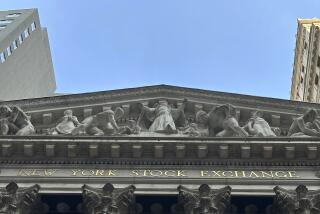IBM Profits Half of Those Foreseen; Market Plunges : Computers: A postwar sales rebound apparently has not occurred. Worldwide economic weakness is blamed.
- Share via
SAN FRANCISCO — International Business Machines Corp. disclosed Tuesday that its profits for the first three months of the year will be only half of what analysts had anticipated, helping to send the Dow Jones industrial average tumbling 62 points and raising fears that some segments of the economy have yet to begin recovering.
IBM attributed the bad news entirely to weakness in the economy worldwide rather than to any difficulties with its products. Analysts said the company had been hoping for a rebound in sales after the end of the Gulf War, but such a recovery apparently has not occurred.
Any major dip in orders for IBM--the world’s largest computer manufacturer--could indicate that businesses worldwide are slowing their purchases of computers and other equipment.
The announcement also indicates that European economies--most of which are stronger than the United States’--may be slipping. European sales growth over the past year has been a key source of strength for most computer companies as they cope with a poor U.S. economy.
IBM’s stock fell about 10% after the announcement, closing $12.75 a share lower at $115.125. That was the major reason for a 62.13-point plunge in the Dow Jones industrial average, its biggest one-day drop since October.
Stocks of other computer firms followed IBM down, with Digital Equipment falling $5.25 a share to close at $71.375 and Compaq Computer dropping $3.625 a share to finish at $61.25. Amdahl, which issued a statement saying that it was expecting poor earnings because of weakness in Europe, fell $1.375 per share to close at $13.50.
Still, not all technology stocks were down for the day, raising hopes that IBM’s bombshell will not completely deflate the rally in technology stocks that began last fall.
Also, IBM’s problems may not be a good indicator of the overall health of the economy, in part because computer purchases reflect corporate capital spending budgets that are often slow to adjust to economic fluctuations. Economic figures also released Tuesday, for example, showed U.S. housing starts posting their biggest gain in a year. Housing tends to be one of the first segments of the economy to rebound from recession.
Analysts generally had been predicting that IBM would earn about $1.80 a share--or about $1 billion--for the quarter ending March 31.
Analysts and industry officials were stunned by IBM’s announcement, but they had mixed views as to whether it signaled an impending blood bath for other computer companies and the economy in general.
Michael Murphy, publisher of the California Technology Stock Letter and a well-known pessimist about the economic situation, said: “The strength in Europe has been carrying the industry, but now we’re clearly losing that strength and heading into a worldwide recession.” He said technology companies would not begin to see a turnaround until year-end at the earliest.
Rick J. Martin of Prudential Securities agreed that conditions would get worse before they got better, though he said the recent run-up in technology stocks was largely a seasonal phenomenon. He also pointed out that the recent strength of the dollar was hurting overseas sales and that a continued deterioration of the economic situation in Europe would drive the U.S. currency even higher and thus do additional damage to U.S. exports. A rising dollar makes foreign goods cheaper relative to U.S. products.
Sally Dodge, head of the world forecasting service for WEFA Group, an economic forecasting firm, said Europe was following the United States into an economic slump.
“There is going to be weakness in Europe this year--they are lagging a little bit behind the U.S.,” she said. The United Kingdom is already in recession, economists say, and growth has slowed dramatically in France, Italy and Spain.
But Pierre Lamond, a Silicon Valley venture capitalist, was much more optimistic and said he no longer considered IBM to be an accurate bellwether for the computer industry as a whole. “For the small companies we have seen, business has been pretty good--we don’t see a slowdown,” he said. “Last summer there was a lot of apprehension, but now things seem to be picking up.”
Last summer and fall, many in the computer industry feared that the economic slowdown and Gulf conflict would result in a precipitous drop in sales. Manufacturers of large computer systems, such as Digital Equipment, were already experiencing severe problems as customers moved to desktop machines, and some analysts believed that it would only be a matter of time until personal computer shipments slowed dramatically.
A broad-based drop in computer sales, in turn, would damage companies that supply computer chips, software, disk drives and many other products.
Yet personal computer vendors such as Compaq and Apple Computer continued to post strong results through the end of 1990, with Compaq in particular relying heavily on growth in Europe to offset a slow U.S. market. Eckhard Pfeiffer, Compaq’s chief operating officer, said Tuesday that business in Europe still appears to be strong.
The absence of the much-feared bad news helped fuel a rally that boosted technology stocks by about 30% over the past several months and led the stock market as a whole to broad gains. But IBM’s latest announcement Tuesday renewed fears that business would decline sharply.
More to Read
Inside the business of entertainment
The Wide Shot brings you news, analysis and insights on everything from streaming wars to production — and what it all means for the future.
You may occasionally receive promotional content from the Los Angeles Times.










